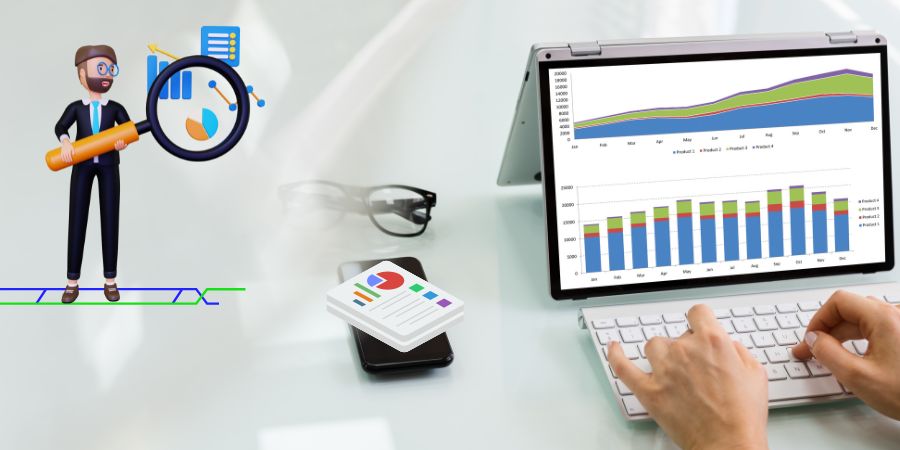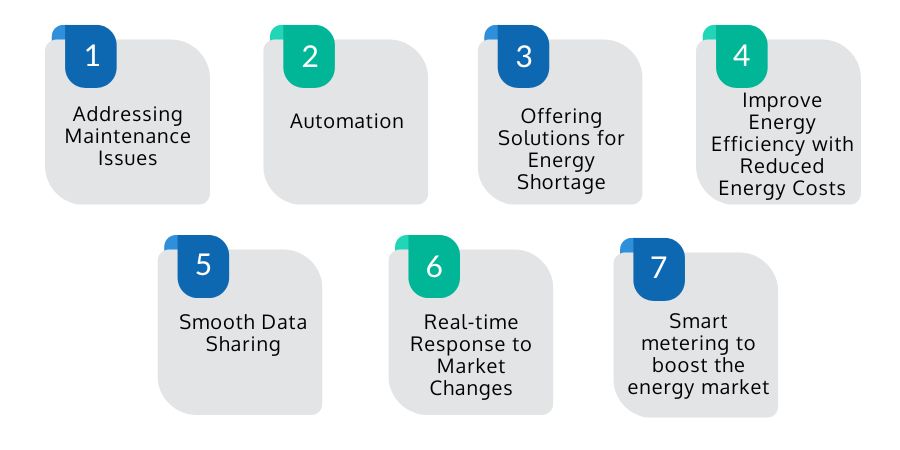
Energy drives industry, businesses, and our daily lives. The energy sector is expanding with a steady influx of invaluable data thanks to application sensors, wireless transmission, network connection, and cloud computing. Data analytics tools empower energy & utility businesses to capture the intricacies of data provided by various energy sectors and utilize it more effectively.
Energy analytics is at the forefront of sustainable and efficient decision-making and supporting energy suppliers to control and optimize energy-related key performance indicators (KPIs) such as production costs, consumption, and distribution.
Explore how energy data analytics are revolutionalizing the energy market at an accelerated pace in this blog.
What is Energy Data Analytics?
Energy data analytics uses statistical software and new technologies such as big data and machine learning to support energy enterprises in analyzing all energy production and consumption elements. This enables businesses to forecast demand, optimize real-time production costs, increase distribution, and identify trends while predicting future market behavior.
Energy data analytics benefits energy managers by eliminating grid downtime, predicting changes to fluctuating market demand in a real-time, and balancing assets. Energy users such as office buildings and factory managers can use energy data analytics to discover areas for possible energy savings and work with site management on energy consumption issues while making better operational and financial business decisions.
The adoption of smart technologies can make energy data analyses easier. For instance, smart grids are reliable and enable automatic load balancing while staying energy efficient. Smart meters provide real-time monitoring of energy consumption and make alerts or changes if energy is used excessively.
Why is Energy Data Analytics Important?
The energy & utility industry is vast, comprising multiple sectors, units, and processes. This complicates data collection or choosing the right energy KPI and data analysis as energy sources are distinct, difficult to combine, and always evolving. Here, energy data analytics is essential for energy companies to manage and load low-cost, high-availability energy. These tools streamline data and allow businesses to keep track of demand and supply patterns. At the same time, there is an increasing demand for sustainable energy and customer accountability that these analytics can deliver.
Energy analytics harnesses the potential of energy data to bring significant change from financial savings to environmental benefits. Energy analytics benefits many businesses by cutting costs and waste, particularly in the manufacturing, cement, steel, and food processing domains. However, this poses problems such as increasing energy consumption, diversity of energy resources, and the requirement for real-time insights into energy flows.

7 Applications of Energy Data Analytics
1. Addressing Maintenance Issues
Commercial building owners are primarily concerned about equipment maintenance. If it’s not fully functional, the companies may face significant fallouts. Unplanned downtimes, shutdowns, interventions, and outages are major blocks for businesses, disrupting services and costing millions.
Many businesses are using smart technologies and data models to improve performance measures in energy consumption. Using smart technology is the savior here. The sensory data develops an approach that ensures the predictive maintenance of equipment. It eliminates unnecessary stress or load and equipment failure.
2. Automation
While the demand for effective energy management is growing, manual activity such as creating and sending reports, conducting research, or understanding a project tends to be error-prone. These tasks can be automated using energy data analytics while businesses focus on critical prospects.
Analytical tools provide essential data related to energy consumption and behavioral trends at a single click.
3. Offering Solutions for Energy Shortage
Several industries are undergoing substantial transformations with innovation. It is modernizing how electricity is produced, distributed, and consumed. However, the surge in global energy consumption is another issue pressuring businesses to turn to smart metering for optimal energy consumption.
Advanced analytical systems monitor energy use and generation patterns while anticipating surges and shortages proactively. This enables businesses to automate responses to any disruptions to maintain a continuous and inexpensive electricity supply. This leads to preventing the energy crisis that most businesses are currently facing.
4. Improve Energy Efficiency with Reduced Energy Costs
Every organization can adopt necessary changes at a low cost if it receives real-time insights from energy data analytics. This powerful technology automatically detects problems and excessive energy consumption. Businesses can save a significant amount of money each year by fixing such problems. A study shows that companies can save up to 10% by implementing this technology.
5. Smooth Data Sharing
Collecting accurate data is critical, based on which users make informed decisions about their energy consumption. Many enterprises have recognized the advantages of energy efficiency. However, data must be shared and delivered in a precise manner.
Energy analytics facilitates the work by simplifying data. This ensures that significant energy data will be recovered appropriately. It also allows businesses to share data within teams to work on the issues immediately.
6. Real-time Response to Market Changes
Energy data analytics provides a real-time response to market fluctuations, allowing a more comprehensive view of the energy & utility industry. It helps
- Track health and environmental objectives.
- Improve business decisions based on energy market forecasts.
- Reduce downtime while increasing worker safety and productivity.
- Forecast changes in market demand.
- Balance resources and asset integrity while keeping costs low.
7. Smart Metering to Boost the Energy Market
Grid operations, field services, resource planning, customer experience, and regulatory compliance are the benefits of smart metering. It helps forecast demand based on data acquired that can increase energy industry growth. Furthermore, energy analytics with smart metering can estimate energy consumption while managing demand and supply and reducing energy waste.
For example, some businesses use energy data analytics tools with smart meters to obtain insights from the smart grid that, in turn, provides information to dwindle excess energy consumption and boost profit margins.



























 Batoi Corporate Office
Batoi Corporate Office